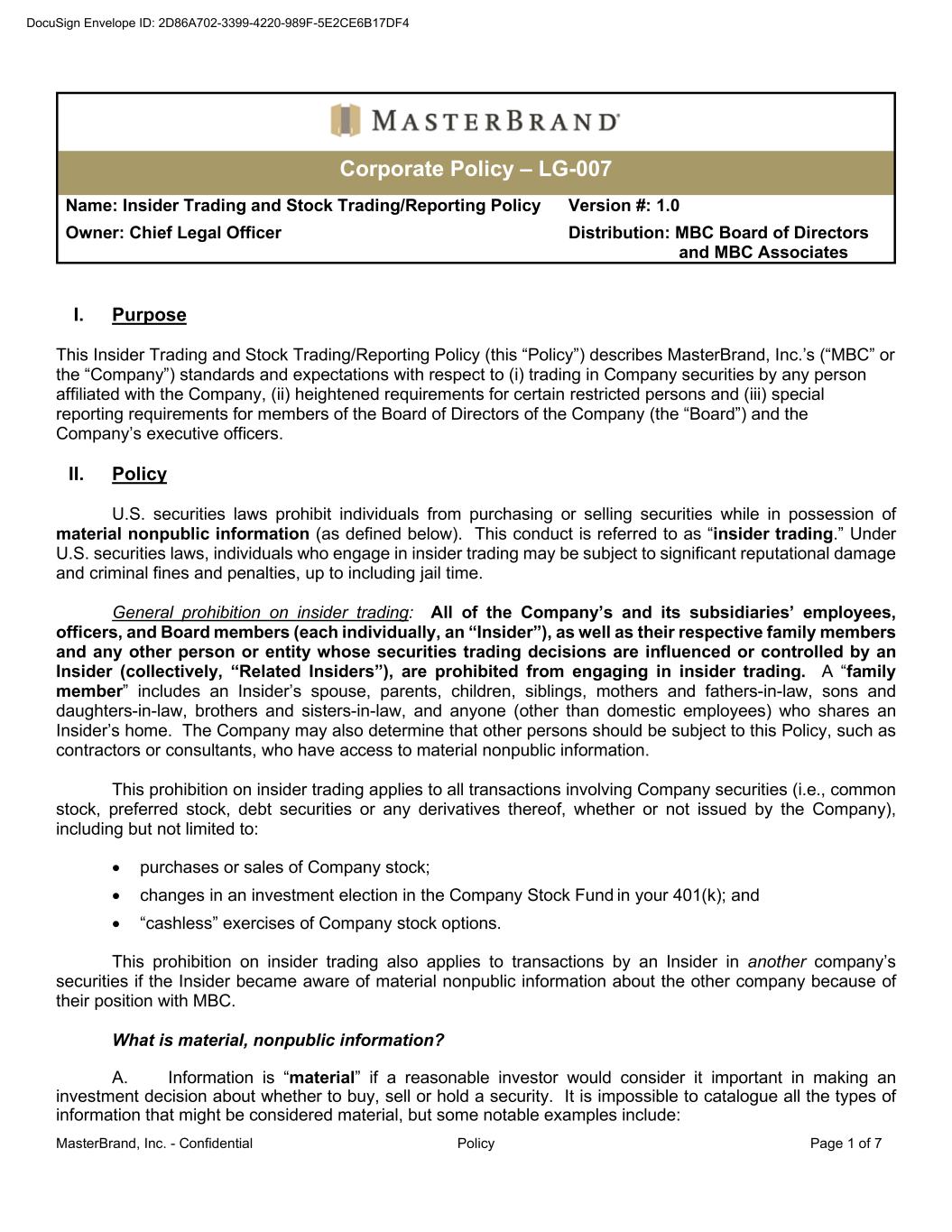
MasterBrand, Inc. - Confidential Policy Page 1 of 7 Corporate Policy – LG-007 Name: Insider Trading and Stock Trading/Reporting Policy Version #: 1.0 Owner: Chief Legal Officer Distribution: MBC Board of Directors and MBC Associates I. Purpose This Insider Trading and Stock Trading/Reporting Policy (this “Policy”) describes MasterBrand, Inc.’s (“MBC” or the “Company”) standards and expectations with respect to (i) trading in Company securities by any person affiliated with the Company, (ii) heightened requirements for certain restricted persons and (iii) special reporting requirements for members of the Board of Directors of the Company (the “Board”) and the Company’s executive officers. II. Policy U.S. securities laws prohibit individuals from purchasing or selling securities while in possession of material nonpublic information (as defined below). This conduct is referred to as “insider trading.” Under U.S. securities laws, individuals who engage in insider trading may be subject to significant reputational damage and criminal fines and penalties, up to including jail time. General prohibition on insider trading: All of the Company’s and its subsidiaries’ employees, officers, and Board members (each individually, an “Insider”), as well as their respective family members and any other person or entity whose securities trading decisions are influenced or controlled by an Insider (collectively, “Related Insiders”), are prohibited from engaging in insider trading. A “family member” includes an Insider’s spouse, parents, children, siblings, mothers and fathers-in-law, sons and daughters-in-law, brothers and sisters-in-law, and anyone (other than domestic employees) who shares an Insider’s home. The Company may also determine that other persons should be subject to this Policy, such as contractors or consultants, who have access to material nonpublic information. This prohibition on insider trading applies to all transactions involving Company securities (i.e., common stock, preferred stock, debt securities or any derivatives thereof, whether or not issued by the Company), including but not limited to: • purchases or sales of Company stock; • changes in an investment election in the Company Stock Fund in your 401(k); and • “cashless” exercises of Company stock options. This prohibition on insider trading also applies to transactions by an Insider in another company’s securities if the Insider became aware of material nonpublic information about the other company because of their position with MBC. What is material, nonpublic information? A. Information is “material” if a reasonable investor would consider it important in making an investment decision about whether to buy, sell or hold a security. It is impossible to catalogue all the types of information that might be considered material, but some notable examples include: DocuSign Envelope ID: 2D86A702-3399-4220-989F-5E2CE6B17DF4
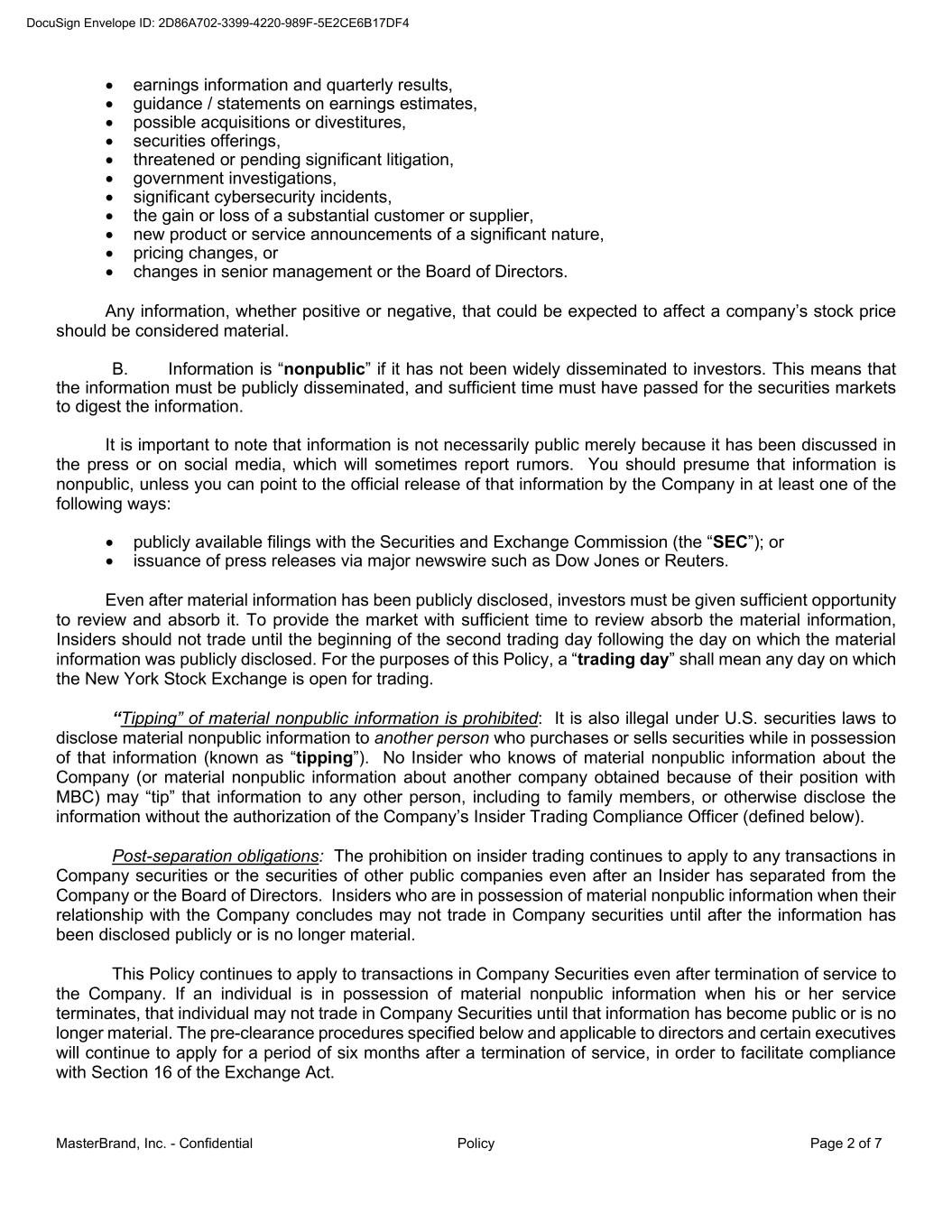
MasterBrand, Inc. - Confidential Policy Page 2 of 7 • earnings information and quarterly results, • guidance / statements on earnings estimates, • possible acquisitions or divestitures, • securities offerings, • threatened or pending significant litigation, • government investigations, • significant cybersecurity incidents, • the gain or loss of a substantial customer or supplier, • new product or service announcements of a significant nature, • pricing changes, or • changes in senior management or the Board of Directors. Any information, whether positive or negative, that could be expected to affect a company’s stock price should be considered material. B. Information is “nonpublic” if it has not been widely disseminated to investors. This means that the information must be publicly disseminated, and sufficient time must have passed for the securities markets to digest the information. It is important to note that information is not necessarily public merely because it has been discussed in the press or on social media, which will sometimes report rumors. You should presume that information is nonpublic, unless you can point to the official release of that information by the Company in at least one of the following ways: • publicly available filings with the Securities and Exchange Commission (the “SEC”); or • issuance of press releases via major newswire such as Dow Jones or Reuters. Even after material information has been publicly disclosed, investors must be given sufficient opportunity to review and absorb it. To provide the market with sufficient time to review absorb the material information, Insiders should not trade until the beginning of the second trading day following the day on which the material information was publicly disclosed. For the purposes of this Policy, a “trading day” shall mean any day on which the New York Stock Exchange is open for trading. “Tipping” of material nonpublic information is prohibited: It is also illegal under U.S. securities laws to disclose material nonpublic information to another person who purchases or sells securities while in possession of that information (known as “tipping”). No Insider who knows of material nonpublic information about the Company (or material nonpublic information about another company obtained because of their position with MBC) may “tip” that information to any other person, including to family members, or otherwise disclose the information without the authorization of the Company’s Insider Trading Compliance Officer (defined below). Post-separation obligations: The prohibition on insider trading continues to apply to any transactions in Company securities or the securities of other public companies even after an Insider has separated from the Company or the Board of Directors. Insiders who are in possession of material nonpublic information when their relationship with the Company concludes may not trade in Company securities until after the information has been disclosed publicly or is no longer material. This Policy continues to apply to transactions in Company Securities even after termination of service to the Company. If an individual is in possession of material nonpublic information when his or her service terminates, that individual may not trade in Company Securities until that information has become public or is no longer material. The pre-clearance procedures specified below and applicable to directors and certain executives will continue to apply for a period of six months after a termination of service, in order to facilitate compliance with Section 16 of the Exchange Act. DocuSign Envelope ID: 2D86A702-3399-4220-989F-5E2CE6B17DF4
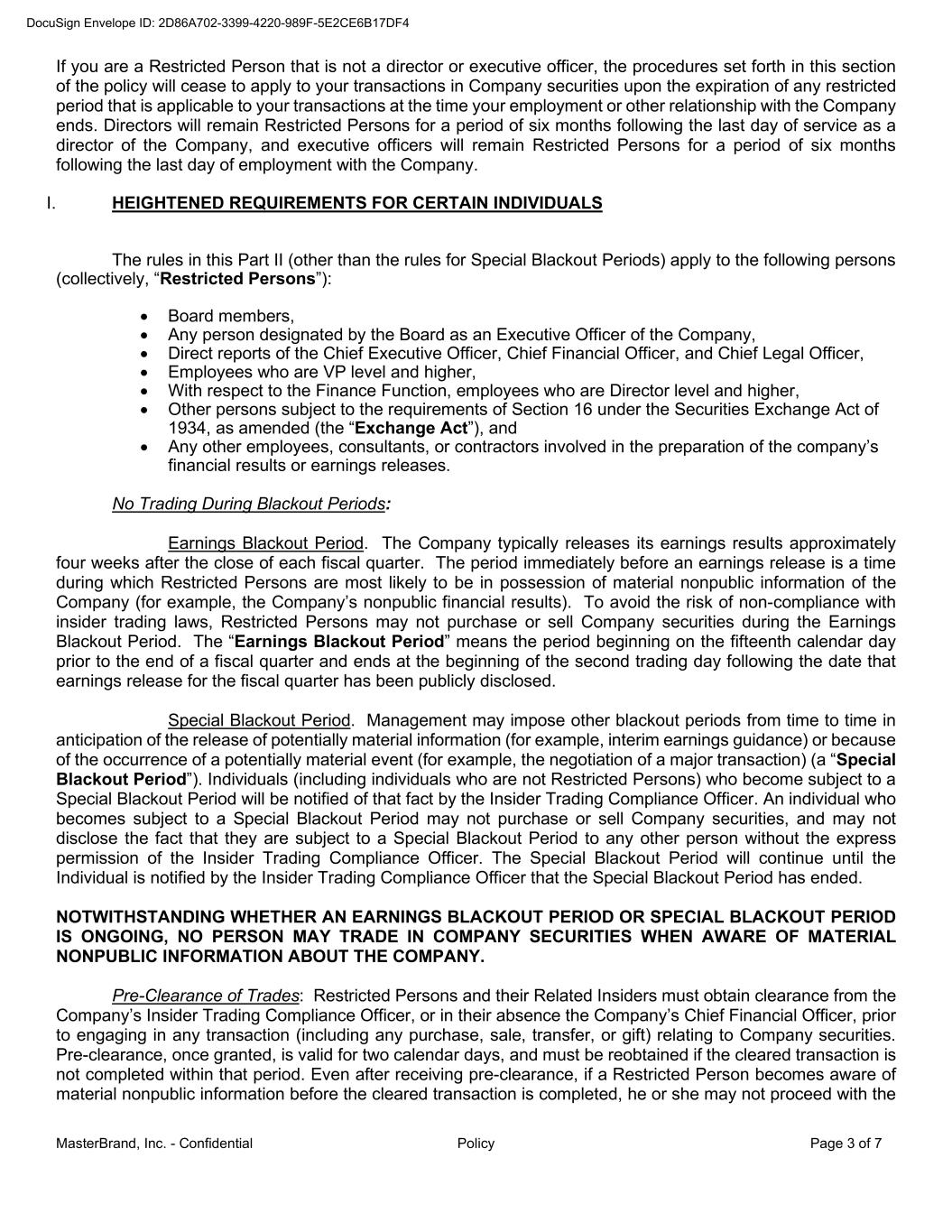
MasterBrand, Inc. - Confidential Policy Page 3 of 7 If you are a Restricted Person that is not a director or executive officer, the procedures set forth in this section of the policy will cease to apply to your transactions in Company securities upon the expiration of any restricted period that is applicable to your transactions at the time your employment or other relationship with the Company ends. Directors will remain Restricted Persons for a period of six months following the last day of service as a director of the Company, and executive officers will remain Restricted Persons for a period of six months following the last day of employment with the Company. I. HEIGHTENED REQUIREMENTS FOR CERTAIN INDIVIDUALS The rules in this Part II (other than the rules for Special Blackout Periods) apply to the following persons (collectively, “Restricted Persons”): • Board members, • Any person designated by the Board as an Executive Officer of the Company, • Direct reports of the Chief Executive Officer, Chief Financial Officer, and Chief Legal Officer, • Employees who are VP level and higher, • With respect to the Finance Function, employees who are Director level and higher, • Other persons subject to the requirements of Section 16 under the Securities Exchange Act of 1934, as amended (the “Exchange Act”), and • Any other employees, consultants, or contractors involved in the preparation of the company’s financial results or earnings releases. No Trading During Blackout Periods: Earnings Blackout Period. The Company typically releases its earnings results approximately four weeks after the close of each fiscal quarter. The period immediately before an earnings release is a time during which Restricted Persons are most likely to be in possession of material nonpublic information of the Company (for example, the Company’s nonpublic financial results). To avoid the risk of non-compliance with insider trading laws, Restricted Persons may not purchase or sell Company securities during the Earnings Blackout Period. The “Earnings Blackout Period” means the period beginning on the fifteenth calendar day prior to the end of a fiscal quarter and ends at the beginning of the second trading day following the date that earnings release for the fiscal quarter has been publicly disclosed. Special Blackout Period. Management may impose other blackout periods from time to time in anticipation of the release of potentially material information (for example, interim earnings guidance) or because of the occurrence of a potentially material event (for example, the negotiation of a major transaction) (a “Special Blackout Period”). Individuals (including individuals who are not Restricted Persons) who become subject to a Special Blackout Period will be notified of that fact by the Insider Trading Compliance Officer. An individual who becomes subject to a Special Blackout Period may not purchase or sell Company securities, and may not disclose the fact that they are subject to a Special Blackout Period to any other person without the express permission of the Insider Trading Compliance Officer. The Special Blackout Period will continue until the Individual is notified by the Insider Trading Compliance Officer that the Special Blackout Period has ended. NOTWITHSTANDING WHETHER AN EARNINGS BLACKOUT PERIOD OR SPECIAL BLACKOUT PERIOD IS ONGOING, NO PERSON MAY TRADE IN COMPANY SECURITIES WHEN AWARE OF MATERIAL NONPUBLIC INFORMATION ABOUT THE COMPANY. Pre-Clearance of Trades: Restricted Persons and their Related Insiders must obtain clearance from the Company’s Insider Trading Compliance Officer, or in their absence the Company’s Chief Financial Officer, prior to engaging in any transaction (including any purchase, sale, transfer, or gift) relating to Company securities. Pre-clearance, once granted, is valid for two calendar days, and must be reobtained if the cleared transaction is not completed within that period. Even after receiving pre-clearance, if a Restricted Person becomes aware of material nonpublic information before the cleared transaction is completed, he or she may not proceed with the DocuSign Envelope ID: 2D86A702-3399-4220-989F-5E2CE6B17DF4
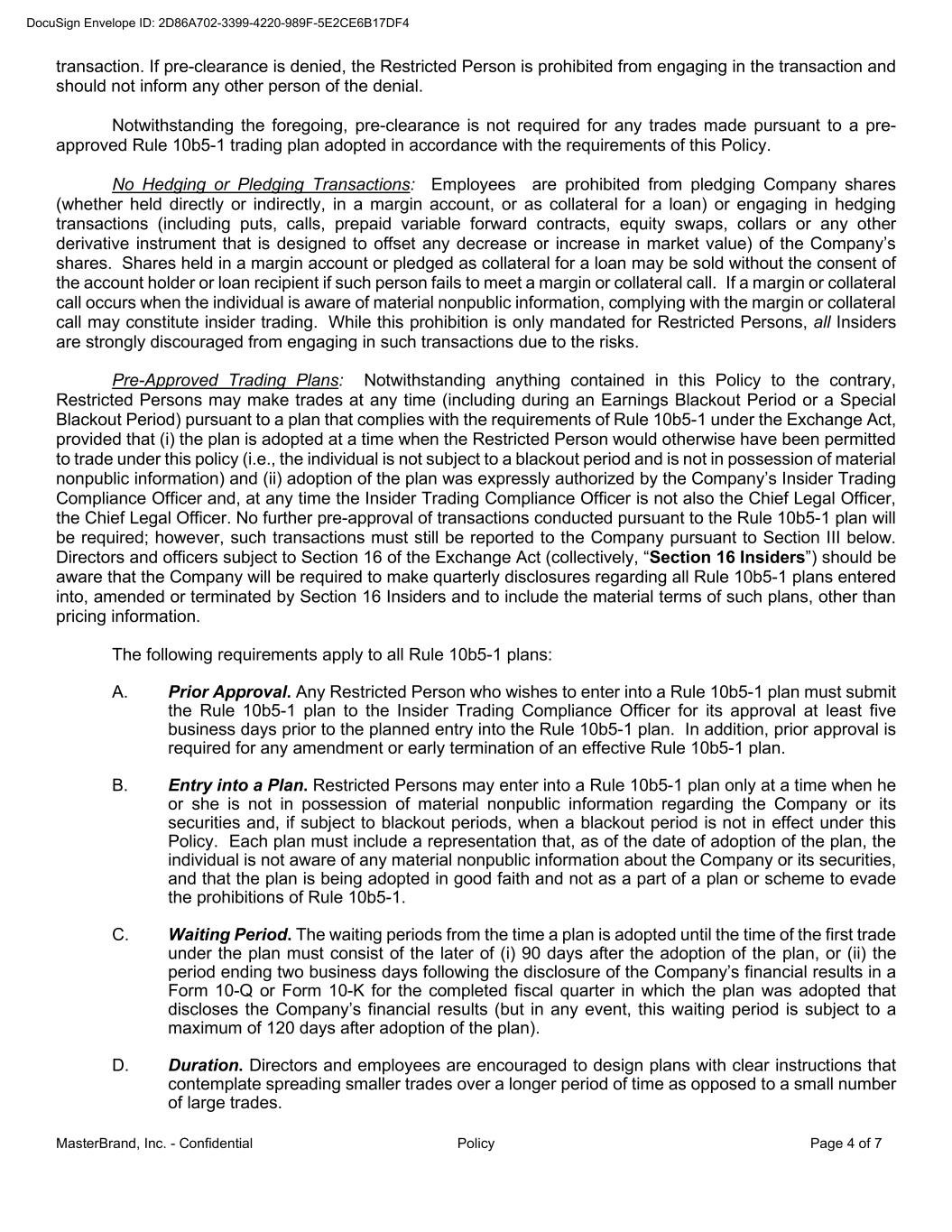
MasterBrand, Inc. - Confidential Policy Page 4 of 7 transaction. If pre-clearance is denied, the Restricted Person is prohibited from engaging in the transaction and should not inform any other person of the denial. Notwithstanding the foregoing, pre-clearance is not required for any trades made pursuant to a pre- approved Rule 10b5-1 trading plan adopted in accordance with the requirements of this Policy. No Hedging or Pledging Transactions: Employees are prohibited from pledging Company shares (whether held directly or indirectly, in a margin account, or as collateral for a loan) or engaging in hedging transactions (including puts, calls, prepaid variable forward contracts, equity swaps, collars or any other derivative instrument that is designed to offset any decrease or increase in market value) of the Company’s shares. Shares held in a margin account or pledged as collateral for a loan may be sold without the consent of the account holder or loan recipient if such person fails to meet a margin or collateral call. If a margin or collateral call occurs when the individual is aware of material nonpublic information, complying with the margin or collateral call may constitute insider trading. While this prohibition is only mandated for Restricted Persons, all Insiders are strongly discouraged from engaging in such transactions due to the risks. Pre-Approved Trading Plans: Notwithstanding anything contained in this Policy to the contrary, Restricted Persons may make trades at any time (including during an Earnings Blackout Period or a Special Blackout Period) pursuant to a plan that complies with the requirements of Rule 10b5-1 under the Exchange Act, provided that (i) the plan is adopted at a time when the Restricted Person would otherwise have been permitted to trade under this policy (i.e., the individual is not subject to a blackout period and is not in possession of material nonpublic information) and (ii) adoption of the plan was expressly authorized by the Company’s Insider Trading Compliance Officer and, at any time the Insider Trading Compliance Officer is not also the Chief Legal Officer, the Chief Legal Officer. No further pre-approval of transactions conducted pursuant to the Rule 10b5-1 plan will be required; however, such transactions must still be reported to the Company pursuant to Section III below. Directors and officers subject to Section 16 of the Exchange Act (collectively, “Section 16 Insiders”) should be aware that the Company will be required to make quarterly disclosures regarding all Rule 10b5-1 plans entered into, amended or terminated by Section 16 Insiders and to include the material terms of such plans, other than pricing information. The following requirements apply to all Rule 10b5-1 plans: A. Prior Approval. Any Restricted Person who wishes to enter into a Rule 10b5-1 plan must submit the Rule 10b5-1 plan to the Insider Trading Compliance Officer for its approval at least five business days prior to the planned entry into the Rule 10b5-1 plan. In addition, prior approval is required for any amendment or early termination of an effective Rule 10b5-1 plan. B. Entry into a Plan. Restricted Persons may enter into a Rule 10b5-1 plan only at a time when he or she is not in possession of material nonpublic information regarding the Company or its securities and, if subject to blackout periods, when a blackout period is not in effect under this Policy. Each plan must include a representation that, as of the date of adoption of the plan, the individual is not aware of any material nonpublic information about the Company or its securities, and that the plan is being adopted in good faith and not as a part of a plan or scheme to evade the prohibitions of Rule 10b5-1. C. Waiting Period. The waiting periods from the time a plan is adopted until the time of the first trade under the plan must consist of the later of (i) 90 days after the adoption of the plan, or (ii) the period ending two business days following the disclosure of the Company’s financial results in a Form 10-Q or Form 10-K for the completed fiscal quarter in which the plan was adopted that discloses the Company’s financial results (but in any event, this waiting period is subject to a maximum of 120 days after adoption of the plan). D. Duration. Directors and employees are encouraged to design plans with clear instructions that contemplate spreading smaller trades over a longer period of time as opposed to a small number of large trades. DocuSign Envelope ID: 2D86A702-3399-4220-989F-5E2CE6B17DF4

MasterBrand, Inc. - Confidential Policy Page 5 of 7 E. Multiple Plans. Generally speaking, an individual entering into a Rule 10b5-1 plan may have only one plan in place at any time. An exception to this restriction applies for certain separate plans with different brokers that would be treated as a single “plan” such as when a person holds Company securities in multiple brokerage accounts. Additionally, an individual may enter into one later-commencing plan so that the waiting period of the later plan can begin to run while an existing plan is in place, provided that the individual does not early terminate the first plan, in which case a full waiting period from the time of such termination must occur. Lastly, individuals may have an additional plan providing only for eligible sell-to-cover transactions, where the plan provides for sales of securities as are necessary to satisfy tax withholding obligations arising exclusively from the vesting of a compensatory stock award. F. Single Transaction. Rule 10b5-1 prohibits more than one plan in any 12-month period that is designed to effect a single transaction. Single transaction plans are generally discouraged. G. Amendments. Amendments to Rule 10b5-1 plans will be permitted only at a time when: (i) the director or employee is not in possession of material nonpublic information and (ii) a blackout period is not in effect. Furthermore, any amendment relating to the amount, price or timing of the purchase or sale of securities will be subject to the same waiting periods as would be applicable to a new plan, as described above. H. Termination. A Rule 10b5-1 plan may be terminated at any time upon advance approval of the Insider Trading Compliance Officer. However, terminating a Rule 10b5-1 plan is strongly discouraged because it may call into question whether the plan was entered into and operated in good faith and not as part of a plan or scheme to evade the insider trading rules, which could affect the availability of the Rule 10b5-1 affirmative defense. I. Outside Trades. Adoption of a Rule 10b5-1 plan does not preclude trading outside of the plan that otherwise is in accordance with this Policy. However, directors and employees should be cognizant of the fact that the Rule 10b5-1 affirmative defense will not apply to such trades outside a Rule 10b5-1 plan. In addition, under Rule 10b5-1, the director or employee may not have further influence over whether, when or how the trades under the plan are made once the plan is put in place, and therefore their trading outside of the plan must not have direct or indirect influence on the trading instructions under the plan. In other words, securities subject to the plan (e.g., shares underlying unexercised stock options) should not be purchased or sold outside the plan. J. Section 16. Each Section 16 Insider understands that the approval or adoption of a Rule 10b5-1 plan in no way reduces or eliminates such person’s obligations under Section 16 of the Exchange Act, including such person’s disclosure and short-swing trading liabilities thereunder. If any questions arise, such person should consult with their own counsel in implementing a Rule 10b5- 1 plan. In addition, each Section 16 Insider must agree to cooperate with the Company in any reporting of the Rule 10b5-1 plan in the Company’s SEC filings.] Appointment and Duties of Insider Trading Compliance Officer: Appointment of Compliance Officer. The Company has appointed the Chief Legal Officer as the Company’s Insider Trading Compliance Officer. Duties of the Compliance Officer. The duties of the Insider Trading Compliance Officer include, but are not limited to, the following: 1. Pre-clearing all transactions involving the Company’s securities by Board members and key employees, in order to determine compliance with this Policy, insider trading laws, Section 16 of the Exchange Act, and Rule 144 promulgated under the Securities Act of 1933, as amended (“Rule 144”). 2. Assisting in the preparation and filing of reports (e.g., Forms 3, 4 and 5) under Section 16 of the Exchange Act (“Section 16”). 3. Serving as the designated Company recipient of copies of reports filed with the SEC under Section 16. DocuSign Envelope ID: 2D86A702-3399-4220-989F-5E2CE6B17DF4
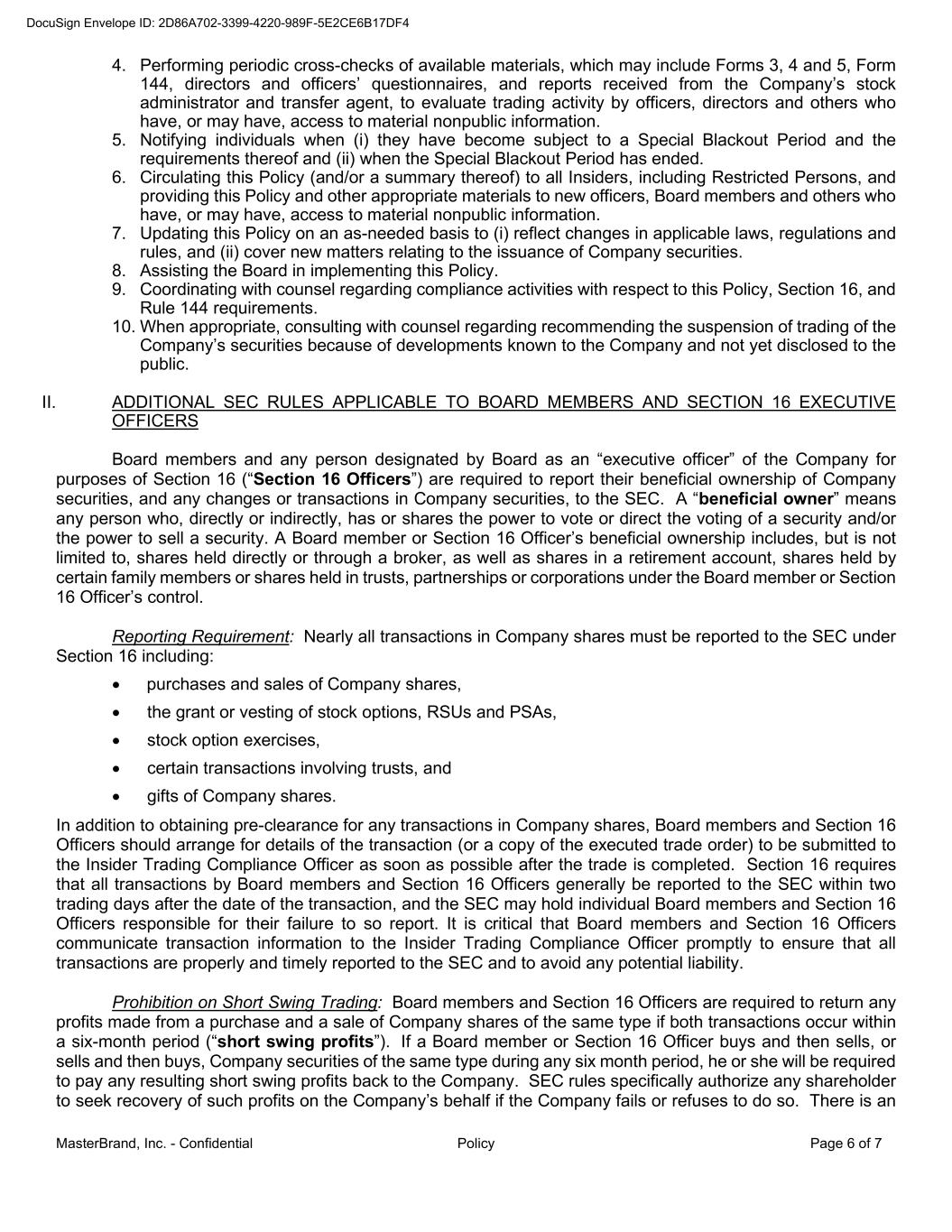
MasterBrand, Inc. - Confidential Policy Page 6 of 7 4. Performing periodic cross-checks of available materials, which may include Forms 3, 4 and 5, Form 144, directors and officers’ questionnaires, and reports received from the Company’s stock administrator and transfer agent, to evaluate trading activity by officers, directors and others who have, or may have, access to material nonpublic information. 5. Notifying individuals when (i) they have become subject to a Special Blackout Period and the requirements thereof and (ii) when the Special Blackout Period has ended. 6. Circulating this Policy (and/or a summary thereof) to all Insiders, including Restricted Persons, and providing this Policy and other appropriate materials to new officers, Board members and others who have, or may have, access to material nonpublic information. 7. Updating this Policy on an as-needed basis to (i) reflect changes in applicable laws, regulations and rules, and (ii) cover new matters relating to the issuance of Company securities. 8. Assisting the Board in implementing this Policy. 9. Coordinating with counsel regarding compliance activities with respect to this Policy, Section 16, and Rule 144 requirements. 10. When appropriate, consulting with counsel regarding recommending the suspension of trading of the Company’s securities because of developments known to the Company and not yet disclosed to the public. II. ADDITIONAL SEC RULES APPLICABLE TO BOARD MEMBERS AND SECTION 16 EXECUTIVE OFFICERS Board members and any person designated by Board as an “executive officer” of the Company for purposes of Section 16 (“Section 16 Officers”) are required to report their beneficial ownership of Company securities, and any changes or transactions in Company securities, to the SEC. A “beneficial owner” means any person who, directly or indirectly, has or shares the power to vote or direct the voting of a security and/or the power to sell a security. A Board member or Section 16 Officer’s beneficial ownership includes, but is not limited to, shares held directly or through a broker, as well as shares in a retirement account, shares held by certain family members or shares held in trusts, partnerships or corporations under the Board member or Section 16 Officer’s control. Reporting Requirement: Nearly all transactions in Company shares must be reported to the SEC under Section 16 including: • purchases and sales of Company shares, • the grant or vesting of stock options, RSUs and PSAs, • stock option exercises, • certain transactions involving trusts, and • gifts of Company shares. In addition to obtaining pre-clearance for any transactions in Company shares, Board members and Section 16 Officers should arrange for details of the transaction (or a copy of the executed trade order) to be submitted to the Insider Trading Compliance Officer as soon as possible after the trade is completed. Section 16 requires that all transactions by Board members and Section 16 Officers generally be reported to the SEC within two trading days after the date of the transaction, and the SEC may hold individual Board members and Section 16 Officers responsible for their failure to so report. It is critical that Board members and Section 16 Officers communicate transaction information to the Insider Trading Compliance Officer promptly to ensure that all transactions are properly and timely reported to the SEC and to avoid any potential liability. Prohibition on Short Swing Trading: Board members and Section 16 Officers are required to return any profits made from a purchase and a sale of Company shares of the same type if both transactions occur within a six-month period (“short swing profits”). If a Board member or Section 16 Officer buys and then sells, or sells and then buys, Company securities of the same type during any six month period, he or she will be required to pay any resulting short swing profits back to the Company. SEC rules specifically authorize any shareholder to seek recovery of such profits on the Company’s behalf if the Company fails or refuses to do so. There is an DocuSign Envelope ID: 2D86A702-3399-4220-989F-5E2CE6B17DF4
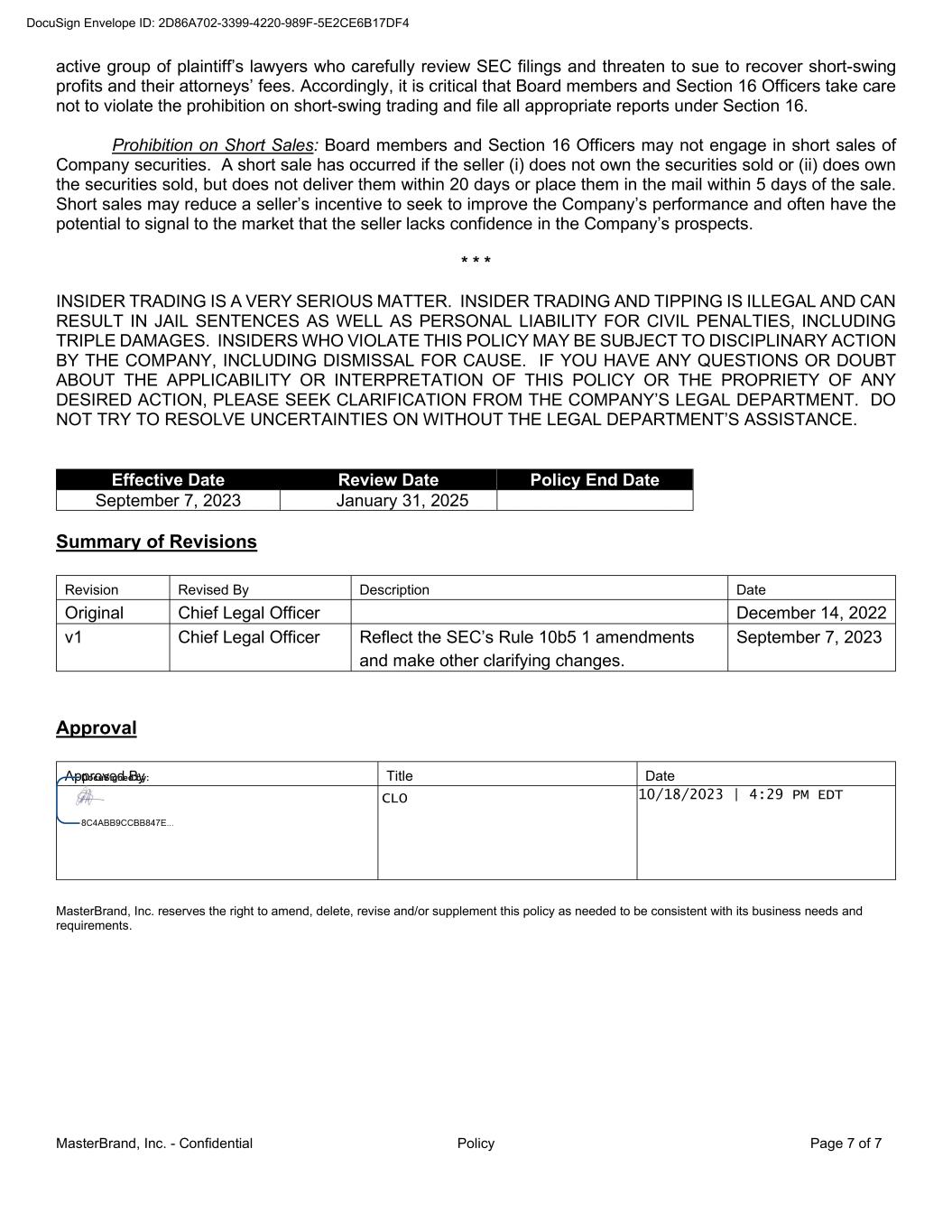
MasterBrand, Inc. - Confidential Policy Page 7 of 7 active group of plaintiff’s lawyers who carefully review SEC filings and threaten to sue to recover short-swing profits and their attorneys’ fees. Accordingly, it is critical that Board members and Section 16 Officers take care not to violate the prohibition on short-swing trading and file all appropriate reports under Section 16. Prohibition on Short Sales: Board members and Section 16 Officers may not engage in short sales of Company securities. A short sale has occurred if the seller (i) does not own the securities sold or (ii) does own the securities sold, but does not deliver them within 20 days or place them in the mail within 5 days of the sale. Short sales may reduce a seller’s incentive to seek to improve the Company’s performance and often have the potential to signal to the market that the seller lacks confidence in the Company’s prospects. * * * INSIDER TRADING IS A VERY SERIOUS MATTER. INSIDER TRADING AND TIPPING IS ILLEGAL AND CAN RESULT IN JAIL SENTENCES AS WELL AS PERSONAL LIABILITY FOR CIVIL PENALTIES, INCLUDING TRIPLE DAMAGES. INSIDERS WHO VIOLATE THIS POLICY MAY BE SUBJECT TO DISCIPLINARY ACTION BY THE COMPANY, INCLUDING DISMISSAL FOR CAUSE. IF YOU HAVE ANY QUESTIONS OR DOUBT ABOUT THE APPLICABILITY OR INTERPRETATION OF THIS POLICY OR THE PROPRIETY OF ANY DESIRED ACTION, PLEASE SEEK CLARIFICATION FROM THE COMPANY’S LEGAL DEPARTMENT. DO NOT TRY TO RESOLVE UNCERTAINTIES ON WITHOUT THE LEGAL DEPARTMENT’S ASSISTANCE. Effective Date Review Date Policy End Date September 7, 2023 January 31, 2025 Summary of Revisions Revision Revised By Description Date Original Chief Legal Officer December 14, 2022 v1 Chief Legal Officer Reflect the SEC’s Rule 10b5 1 amendments and make other clarifying changes. September 7, 2023 Approval Approved By Title Date MasterBrand, Inc. reserves the right to amend, delete, revise and/or supplement this policy as needed to be consistent with its business needs and requirements. DocuSign Envelope ID: 2D86A702-3399-4220-989F-5E2CE6B17DF4 10/18/2023 | 4:29 PM EDTCLO






